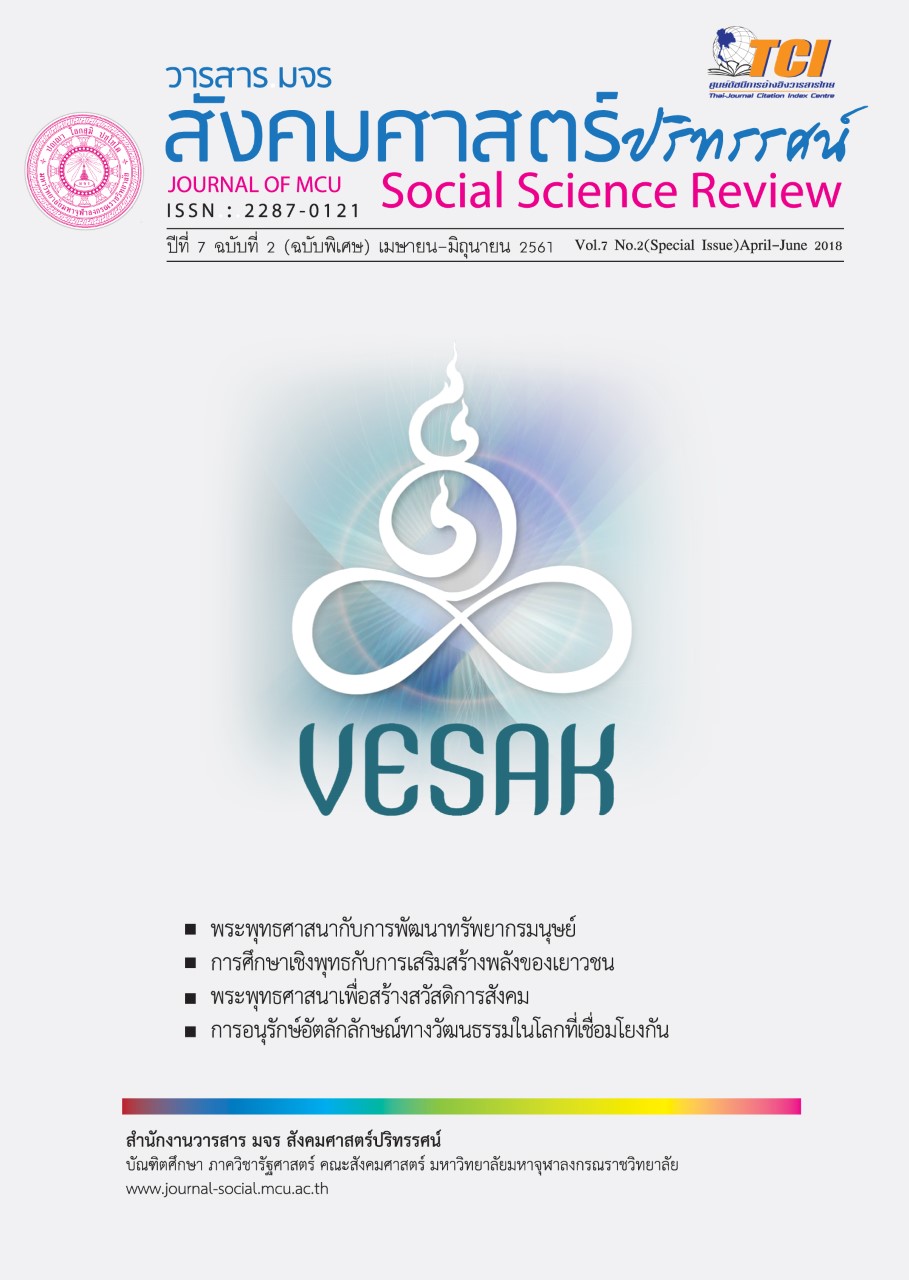การจัดการความรู้ในปฏิสัมภิทามรรค: มิติไตรสิกขา
คำสำคัญ:
การจัดการความรู้, ปฏิสัมภิทามรรคมิติไตรสิกขาบทคัดย่อ
การศึกษาวิจัย เรื่อง การจัดการความรู้ในปฏิสัมภิทามรรค: มิติไตรสิกขา มีวัตถุประสงค์ดังนี้ 1) เพื่อศึกษาการจัดการความรู้ 2) เพื่อศึกษาปฏิสัมภิทามรรคมิติไตรสิกขา 3) เพื่อบูรณาการการจัดการความรู้ในปฏิสัมภิทามรรคมิติไตรสิกขา 4) เพื่อนำเสนอแนวทางการสร้างองค์ความรู้ใหม่เกี่ยวกับรูปแบบการบูรณาการการจัดการความรู้ในปฏิสัมภิทามรรคมิติไตรสิกขา
ผลการวิจัยพบว่า
1.การจัดการความรู้ หมายถึง กระบวนการสร้าง การจัดการ การแบ่งปัน และการนำความรู้ไปใช้ให้บรรลุวัตถุประสงค์ และการจัดการความรู้ในพุทธศาสนา หมายถึง การแสวงหาความรู้ในคำสอนของพระพุทธเจ้า (พระไตรปิฎก) แล้วนำมาจัดการเผยแพร่ต่อสาธารณะ เพื่อใช้ความรู้นั้นมาแก้ไขความทุกข์จนดับทุกข์ได้ 2. ปฏิสัมภิทามรรค เป็นคัมภีร์ที่ว่าด้วยความรู้แตกฉานในหลักธรรมต่าง ๆ รวม 30 กถา หรือ 30 เรื่อง และปฏิสัมภิทามรรคมิติไตรสิกขา เป็นการสังเคราะห์ความรู้ปฏิสัมภิทามรรคลงในกรอบของไตรสิกขา คือ ศีล สมาธิ ปัญญา 3. บูรณาการการจัดการความรู้ในปฏิสัมภิทามรรคมิติไตรสิกขา เป็นการนำแนวคิดการจัดการความรู้ SECI Model มาประยุกต์กับปฏิสัมภิทามรรคมิติไตรสิกขา ทำให้ได้ผลการดำเนินการดังนี้ 1) ได้ความรู้ปฏิสัมภิทามรรคมิติไตรสิกขา 2) นำความรู้ที่ได้สร้างเป็นหนังสือ และe-Document ประเภท PDF File 3) ทำให้ e-Document ประเภท PDF File ได้ถูกเก็บรักษาและเผยแผ่ในสื่อสังคมออนไลน์ประเภทเฟซบุ๊ก 4) กลุ่มผู้ศึกษาปฏิสัมภิทามรรคมิติไตรสิกขาได้รับความรู้และประโยชน์จากการศึกษาบนเครือข่ายสังคมออนไลน์ประเภทเฟซบุ๊ก 4. องค์ความรู้ใหม่ที่ได้จากการวิจัยเกี่ยวกับรูปแบบบูรณาการการจัดการความรู้ในปฏิสัมภิทามรรคมิติไตรสิกขา คือ CAPA Model
เอกสารอ้างอิง
Sathianphong Wannapok. (2012). Description of the Tripitaka. 7. Bangkok: Thammasat.
Sujip Panyanup. (2007). The Tipitaka edition for the public. 17. Bangkok: Mahamakut Buddhist College.
ดาวน์โหลด
เผยแพร่แล้ว
รูปแบบการอ้างอิง
ฉบับ
ประเภทบทความ
สัญญาอนุญาต
ลิขสิทธิ์ (c) 2020 วารสาร มจร สังคมศาสตร์ปริทรรศน์

อนุญาตภายใต้เงื่อนไข Creative Commons Attribution-NonCommercial-NoDerivatives 4.0 International License.
เพื่อให้เป็นไปตามกฎหมายลิขสิทธิ์ ผู้นิพนธ์ทุกท่านต้องลงลายมือชื่อในแบบฟอร์มใบมอบลิขสิทธิ์บทความให้แก่วารสารฯ พร้อมกับบทความต้นฉบับที่ได้แก้ไขครั้งสุดท้าย นอกจากนี้ ผู้นิพนธ์ทุกท่านต้องยืนยันว่าบทความต้นฉบับที่ส่งมาตีพิมพ์นั้น ได้ส่งมาตีพิมพ์เฉพาะในวารสาร มจร สังคมศาสตร์ปริทรรศน์ เพียงแห่งเดียวเท่านั้น หากมีการใช้ภาพหรือตารางหรือเนื้อหาอื่นๆ ของผู้นิพนธ์อื่นที่ปรากฏในสิ่งตีพิมพ์อื่นมาแล้ว ผู้นิพนธ์ต้องขออนุญาตเจ้าของลิขสิทธิ์ก่อน พร้อมทั้งแสดงหนังสือที่ได้รับการยินยอมต่อบรรณาธิการ ก่อนที่บทความจะได้รับการตีพิมพ์ หากไม่เป็นไปตามข้อกำหนดเบื้องต้น ทางวารสารจะถอดบทความของท่านออกโดยไม่มีข้อยกเว้นใดๆ ทั้งสิ้น





